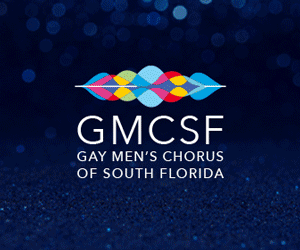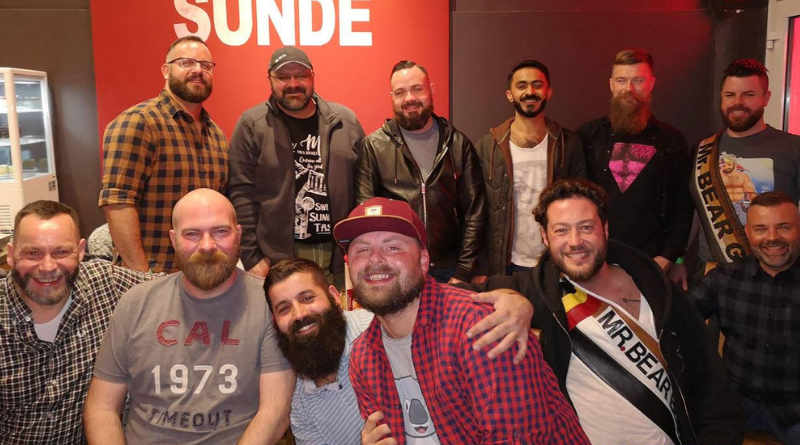
Bear Tracks: The Rise and Spread of German Bear Culture
In 2004 Querverlag, a gay book publishing company in Berlin, published Der Bärenkult: Das Tier im Mann (The Bear Cult: The Animal in the Man). Publisher Jim Baker, an American transplant, sent me a copy of the book, saying he had been inspired by my Bear Book. It contains numerous essays on bear history, in general, and interviews with noted movers and shakers and other personalities in the German bear scene in the 1990s and early 2000s. The writers’ tone is typically “bearish playful.” Writers track how the American bear identity was imported in toto and then developed additional, purely German characteristics. Articles include the bear code, the history of BEAR magazine, the Lonestar Saloon, Craig Byrnes and his International Bear Brotherhood Flag, and the first International Mr. Bear contests at IBR in San Francisco.
Snice the early postwar years, Germans have been obsessed with American pop culture. American rock music especially, but also American TV shows, youth fashion (the price of blue jeans imported from the US in the 1970s boggled my mind), and the American “laid back” attitudes (so different from traditional German formality) gradually transformed German culture. This Americanization of German culture continues to this day, in particular, outpacing America’s acceptance of queer people, liberalizing laws and mainstreaming queer social and sexual practices. I’ve been told Frankfurt International Airport has an onsite gay sauna for travelers needing to “release their tension” between flights.
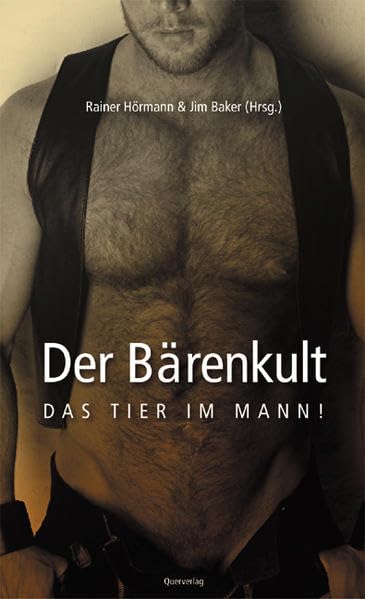
A key element in the absorption of American pop culture includes the massive infusion of borrowing words from American English. The spread of computers and electronic technology, including the invention of an entire new technical vocabulary, has created loan words en masse. As a graduate student in West Germany the 1970s, I recall the arrival of terms like “shit” (hashish), “ausgeflippt,” (flipped out) and “abgefuckt” (fucked up). The verb “to google” in German is “googlen.” High tech words, like Computer, Handy (mobile phone), and Internet are everyday terms. German nouns have gender. The tradition of assigning gender to a loan word is usually based on what the equivalent German word is. A simple example: die Queen (feminine) from die Königin. Other words require gender to be randomly assigned. I could never guess that it’s der Computer (masculine), das Internet (neuter), and das Handy (neuter)? My intuition says it should be die Handy (feminine), so I aways say die Handy, tipping off that I am not a native speaker.
The introduction of concepts from the American gay movement in the 1970s brought its own challenges. “Coming out” and “gay community” were difficult. In the 1970s “to come out” was rendered as “sich zu seiner Homosexualität bekennen” (to confess to one’s homosexuality). The phrase today is “sich outen als schwul.” There was no noun for the German. The term today is “das Coming-out.” Because of the lingering taint of Nazism on the word “Volksgemeinschaft” (this is the term used untranslated in English. It is the Nazi concept of “folk community” or “racial community,” meaning Hitler’s “superior Aryan race”). Today’s term is “die Gay-Community.” And here is a sample of leathersex terms (and I’m not going to guess the genders): Hanky-Code, Dating-App, Fetisch-Community, BDSM, Rubber, and Sportswear. It seems to be mostly English words and German verbs.
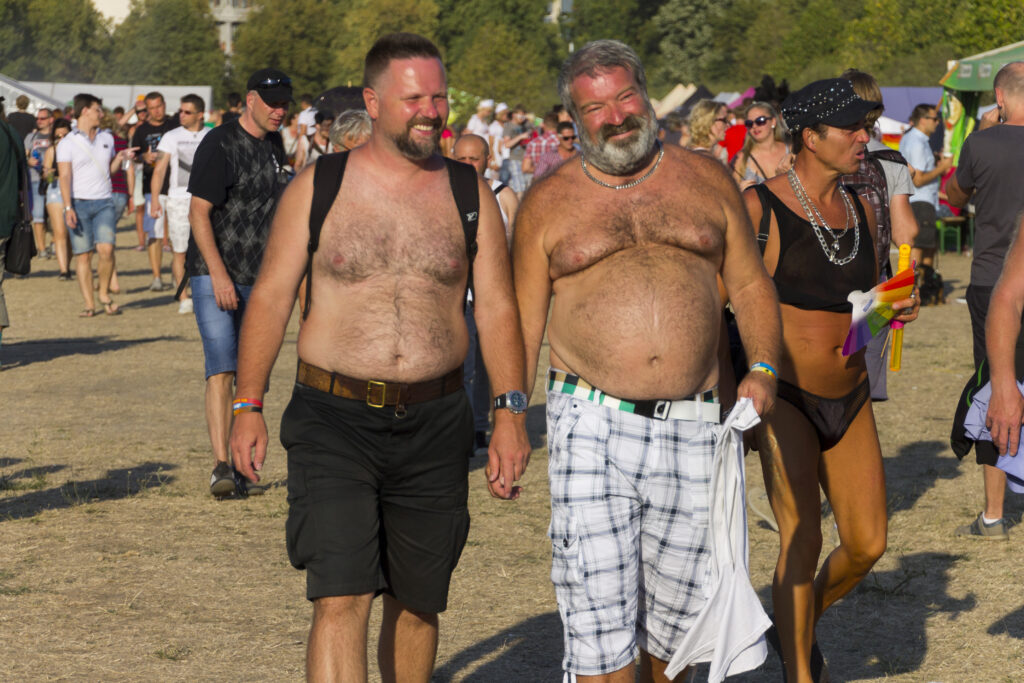
How to speak bear in German is also easy for English speakers. Bear types include: der Daddybär, der Grizzly, der Wolf, der Otter, der Slimbär, der Chubby, der Muskelbär
and der Worker-/Truckerbär. Translation help is needed for der Bär an sich (average bear), der Eisbär (polar bear), der Jungbär (cub) and der “mentale” Bär (or chaser). In Der Bärenkult Jim Baker writes about the grammar of “woof.” What gender do you assign the noun? What is the plural form (Woofs, Woofe, or Wöfe)? How do you conjugate the verb “woofen” (consider the especially challenging Konjunktiv II form)? How about inflecting the adjective? It turns out the noun “Woof” is an older loan word as in “dogs woof”) and its original assigned gender was masculine—der Woof. The adjective is also simple—woofig. And how I would say (High German) “Woof!”? in Swabian dialect? Saying “Woofle!” (“Little woof!”) to a hot bear in Stuttgart will let you pass as a local. But no worries– English is understood almost universally in the German gay community.
Bear identity first took root in Cologne in the late 1980s (as I mentioned in an early “Bear Tracks” column). Tim Stegmann wrote that “[in Germany] entering a bear bar is a bit like going to a truck stop or a blue-collar bar.” Girth among bears was heralded with the proclamation that “Dick ist schick!” (“Fat is chic!”). The first bear club in Germany– Bartmänner Köln (Cologne Bearded Men) — was founded in 1984 by leathermen who were more interested in hairy men than in leathersex. Northern European men are among the hairiest in Europe, even though Germen men are generally not noted for being hairy. Turkish-German men, offspring of the Turkish Gastarbeiter (guest workers) of the 1970s, are typically much hairier than Germans of European descent. Mr. Bear Germany 2004 is a furball from Kuwait.
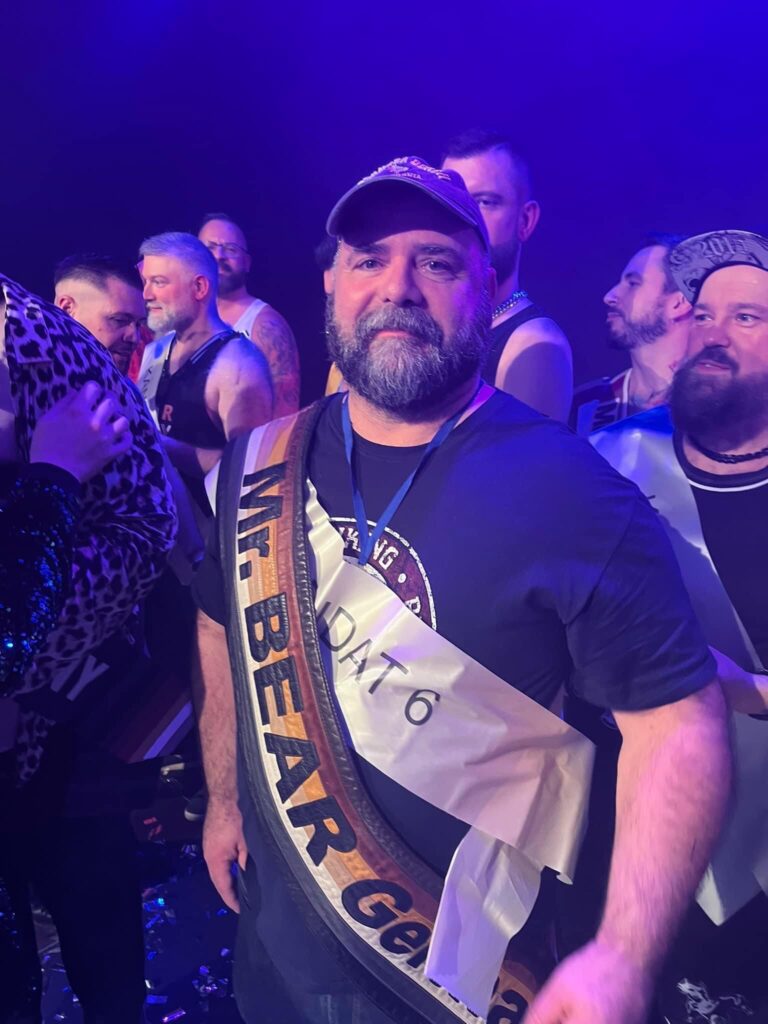
The Cologne club has hosted the annual Mr. Bear Germany contest since 1989, which has been attracting 1500 bears since 2002. One observer reported that the atmosphere there is open and friendly, butchness mixes with affection. One hears German, Dutch, Spanish, Russian, Turkish, Danish, and English being spoken. He also notes a tone of nonjudgmentalness prevailing. Age, nationality, HIV status, vision or hearing impairments are no issue. Sign language is widely seen. The Cologne club currently has key partnerships with other German bear clubs, as well as clubs in Belgium, Luxembourg, the Netherlands, and Sweden.
Bear identity spread rapidly to other German cities—notably, Mannheim, Frankfurt, and Berlin. In 2004 there were 17 bear clubs in 13 different German cities. There were 40 bear clubs across Europe, including one in Russia and two in Turkey. (Since then homosexuality has been recriminalized in both of those countries.) At that time Spain had twelve bear clubs. (I look forward to documenting the history of bears in Spain and the Spanish-speaking world.) Cologne-based BOX Magazine ( https://box-magazin.com ) continues to cover the leather and bear community in Germany and Europe. Cologne remains the bear capital of Germany.
Help Les K Wright in his quest to document bear history by joining the Bear History Project International where you and a group of like-minded individuals can exchange ideas and help to preserve bear history and culture.









